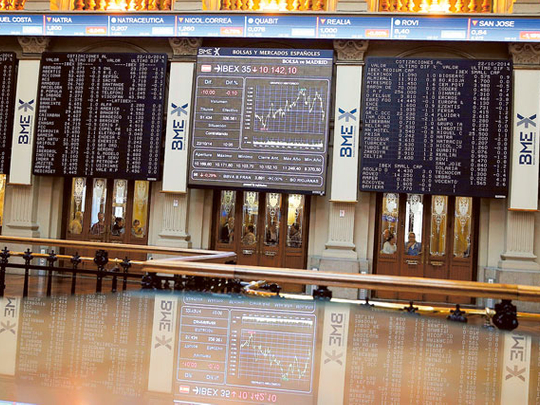
London: European shares slipped and the euro hit a one-week low on Wednesday as reports that at least 11 banks could fail a region-wide financial health check this weekend offset hopes of corporate bond buying by the ECB.
Spanish news agency Efe cited several unidentified sources saying three banks in Greece, three Italian lenders, two Austrian banks, as well as one bank each from Cyprus, Belgium and Portugal will fail the stress tests. The results of the checks, designed to see how banks would cope under adverse economic scenarios, are due on Sunday.
Spanish Economy Minister Luis de Guindos said he was confident Spanish lenders would do well.
The FTSEurofirst 300 index of top European shares was down 0.18 per cent at 1,296.98 points.
“It is a dampener,” said Beaufort Securities sales trader Basil Petrides of the Efe report, which reversed an upbeat start in European trading on better-than-expected company earnings and hopes of ECB corporate bond buying.
So far in Europe’s earnings season, 9 per cent of STOXX 600
companies have reported results, of which 65 per cent have met or beaten profit forecasts, according to data from Thomson Reuters StarMine.
Swiss engineering group ABB, outdoor equipment maker Husqvarna and French carmaker PSA Peugeot Citroen were the latest to do so, while Heineken
bucked the trend, reporting lower-than-expected sales.
European companies also got a lift after several sources told Reuters on Tuesday that the European Central Bank was considering buying corporate bonds on the secondary market and may make a final decision as soon as December with a view to beginning purchases early next year.
That would expand the private sector asset-buying programme the ECB began on Monday, with the aim of giving the euro zone economy a shot in the arm and safeguarding it from deflation, which has already gripped five of its 18 members.
The euro hit a one-week low of 1.26805 against the dollar, partly on the talk of more ECB activism.
“The general takeaway here for a lot of people is that it shows commitment from the ECB trying to find ways to expand its balance sheet. And also it shows ... the ECB wanting to pick up the pace,” said Paul Robson, a currency strategist at RBS.
In Britain, the pound fell after Bank of England minutes showed policymakers were firmly against raising interest rates when they met earlier this month.
NERVES The market moves were tentative as investors remain nervous about the state of the global economy, with the euro zone a particular soft spot. Such worries may intensify on Thursday when regional business surveys are due.
Later on Wednesday, traders will pay close attention to U.S.
inflation data, due at 1230 GMT.
Economists expect annual core CPI inflation to stay flat at 1.7 per cent in September, and a cooler reading would add to speculation that the Federal Reserve will wait longer before raising interest rates.
The consensus view is that the U.S. central bank will decide at its Oct. 28-29 policy meeting to wrap up its third round of asset purchases with new money, known as quantitative easing.
But short-term interest rates futures imply markets do not expect the Fed to hike rates until late 2015.
Euro zone bond yields extended their falls on the back of the ECB’s plans. German 10-year Bund yields, which set the standard for euro zone borrowing costs, fell 1 basis point to 0.86 per cent. Peripheral bond yields fell by more.
“The news of bond buying had quite a beneficial effect on the non-German bond markets, for good reason, so spread narrowing was quite substantial and today there is still some after-effect of that,” said KBC strategist Piet Lammens.
In other markets, oil edged further above $86 a barrel after an industry report showed a smaller-than-expected rise in U.S. crude inventories, extending a tentative recovery in the oil price from a four-year low.
Gold eased from six-week highs.












